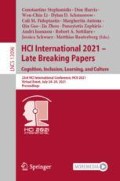Abstract
This study investigated the effects of using self-developed mobile APP and Arduino in English vocabulary learning, to find out the impact on students’ vocabulary learning ability, to understand students’ perception of such learning patterns, and to evaluate the feasibility of lower graders using APP in English vocabulary learning. Arduino was adopted to be associated with APP to provide integrated multimedia support. The study adopted Single Subject Research Design. Five first graders from New Taipei City Taiwan were selected and the experiment was conducted for 10 times in 8 weeks. Data were collected through testing, observation, interviews and questionnaires. The results showed that self-developed English learning APP has a positive impact on students’ vocabulary learning ability. Students gave positive response and held positive attitude toward English learning through APP. Students were willing to learn with English learning APP and enjoy learning. The integration of English learning and APP and Arduino was addressed and hoped to broaden the spectrum of English learning design in mobile devices.
Access this chapter
Tax calculation will be finalised at checkout
Purchases are for personal use only
References
Lan, Y.-J.: Guest editorial: pan-pacific technology-enhanced language learning. Comput. Assist. Lang. Learn. 34(1–2), 1–5 (2021). https://doi.org/10.1080/09588221.2021.1883927
Reinders, H., Lan, Y.J.: Big data in language education and research. Lang. Learn. Technol. 25(1), 1–3 (2021). http://hdl.handle.net/10125/44746
Song, Y.: SMS enhanced vocabulary learning for mobile audiences. Int. J. Mob. Learn. Organ. 2(1), 81–98 (2008)
Milrad, M., Spikol, D.: Anytime, anywhere learning supported by smart phones: experiences and results from the MUSIS project. J. Educ. Technol. Soc. 10(4), 62–70 (2007)
Li, C.: SMS-based vocabulary learning for ESL students (Unpublished master’s thesis). Auckland University of Technology, New Zealand (2009)
Kern, R.: Perspectives on technology in learning and teaching languages. TESOL Q. 40(1), 183–210 (2006)
Cameron, L.: Teaching Languages to Young Learners. Cambridge, Cambridge (2001)
Hargrave, A.C., Sénéchal, M.: A book reading intervention with preschool children who have limited vocabularies: the benefits of regular reading and dialogic reading. Early Child. Res. Q. 15(1), 75–90 (2000)
Hatch, E., Brown, C.: Vocabulary, Semantics, and Language Education. Cambridge University Press, 40 West 20th Street, New York, NY 10011-4211 (1995)
Jalongo, M.R., Sobolak, M.J.: Supporting young children’s vocabulary growth: the challenges, the benefits, and evidence-based strategies. Early Childhood Educ. J. 38(6), 421–429 (2011)
Mayer, R.E., Moreno, R.: A split attention effect in multimedia learning: evidence for dual processing system in working memory. J. Educ. Psychol. 90(2), 312–320 (1998)
Tseng, J.J., Cheng, Y.S., Yeh, H.N.: How pre-service English teachers enact TPACK in the context of web-conferencing teaching: a design thinking approach. Comput. Educ. 128, 171–182 (2019)
Tseng, J.J., Chai, C.S., Tan, L., Park, M.: A critical review of research on technological pedagogical and content knowledge (TPACK) in language teaching. Comput. Assist. Lang. Learn. 1–24 (2020). https://doi.org/10.1080/09588221.2020.1868531
Tai, Y., Ting, Y.-L.: English-learning mobile app designing for engineering students’ cross-disciplinary learning and collaboration: a sample practice and preliminary evaluation. Australas. J. Educ. Technol. 36(2), 120–136 (2020). https://doi.org/10.14742/ajet.4999
Acknowledgments
Note: This study was part of the first author’s Master thesis at National Taipei University of Education, Taipei, Taiwan, and was financially supported by Ministry of Science and Technology in Taiwan under the contract of MOST 105-2511-S-003-007.
Author information
Authors and Affiliations
Corresponding author
Editor information
Editors and Affiliations
Rights and permissions
Copyright information
© 2021 Springer Nature Switzerland AG
About this paper
Cite this paper
Chen, PY., Tai, Y., Tseng, TH., Ting, YL. (2021). Using Self-developed Mobile APP and Arduino to Provide Integrated Multimedia for Lower Graders’ English Vocabulary Learning. In: Stephanidis, C., et al. HCI International 2021 - Late Breaking Papers: Cognition, Inclusion, Learning, and Culture. HCII 2021. Lecture Notes in Computer Science(), vol 13096. Springer, Cham. https://doi.org/10.1007/978-3-030-90328-2_23
Download citation
DOI: https://doi.org/10.1007/978-3-030-90328-2_23
Published:
Publisher Name: Springer, Cham
Print ISBN: 978-3-030-90327-5
Online ISBN: 978-3-030-90328-2
eBook Packages: Computer ScienceComputer Science (R0)

